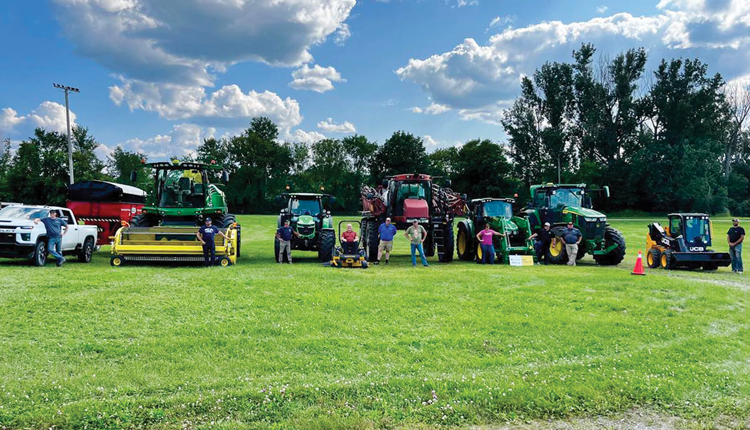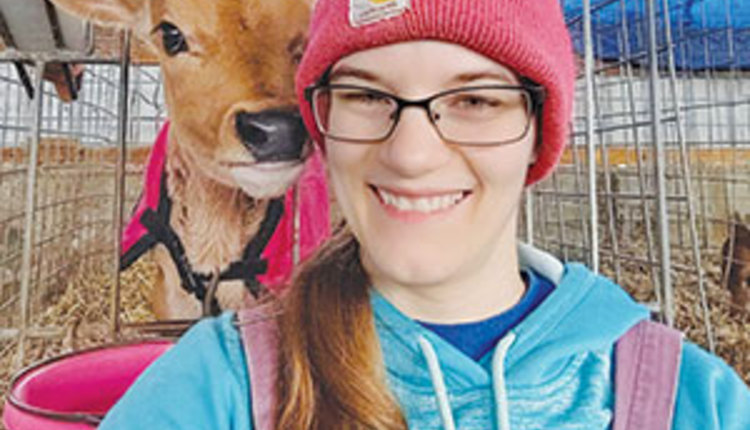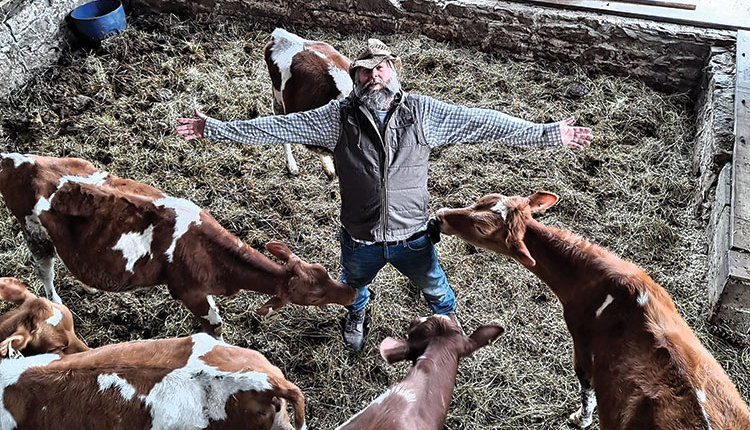
Early this year, Mack Drees of Peshtigo, Wis., was contacted by Holstein USA leadership to ask if he would represent the United States as part of an international group invited to Japan to promote dairy in that country. A Japanese television producer was looking for young, dedicated dairy farmers to appear in a documentary he was filming to promote not only dairy farming but also dairy products.
After investigating to verify the project was legitimate, Holstein Association USA leadership reached out to Drees to see if he would be interested in traveling to Japan. His positive response launched a whirlwind four weeks — creating a daily plan for the farm, making travel arrangements, and obtaining his first passport.
Drees and his family operate Drees Dairy Farm LLC, north of Green Bay. Four years ago, they expanded their operation, building a new freestall barn and installing four robotic milkers. The decision allowed the Drees family to remain a solely family-operated, third-generation Holstein farm.
The television producer in Japan was looking for farmers who would represent their individual countries, sharing their own dairy experiences while at the same time promoting the industry to Japan’s growing dairy interests.
“The project wanted to promote dairy in Japan, and to produce a show to promote and boost dairy farming,” Drees said. “There’s an increasing demand for the product, and they really want to produce more, to reduce the need to import.”
Historically, Japanese dairy farms are small, with an average of 50 head per farm. A few larger dairies do exist, and as the demand for dairy products grows, there has been a push to build interest in larger commercial dairy operations.
With the arrival of his passport and his final travel plans, Drees flew to Japan, a trip that involved several connections and a 13-hour leg from Detroit to Tokyo. The final destination was Hokkaido, Japan, where Drees met his traveling companions for the rest of the journey. The other spokespersons included farmers from New Zealand, France, Great Britain, Denmark, the Netherlands, and Japan.
The other representatives came from wide backgrounds, including graziers and some others using robotic milkers. Drees said he really enjoyed learning more about other farming styles from around the world, as well as their economic views.
“I really gained a better understanding of agriculture from others and the import-export process,” he said. “It’s an issue I wish I had paid more attention to on the home front.”
As they arrived in Hokkaido, the trip involved visiting dairy farms and other dairy manufacturing operations. All of the dairy producers spoke English, but three translators traveled with them all the time, one as a guide and two professional translators to help with the “dairy lingo,” especially on the days they were on farms.
Drees said they felt like actors, with all the attention — and cameras — focused on them. “There were cameras on us all the time, video cameras and people taking photographs,” he said, “pretty much from the time we stepped out of the van in the morning until we were done at the end of the day.”
On the days they traveled to dairy farms, they would have a conversation with the director, then go on the farm and “work,” doing the chores they would do at home. This included scraping stalls, bringing cows to the parlor, milking, feeding calves, and bedding hutches.
Other days included visits to dairy manufacturing plants. Drees said the cheese operation was definitely memorable. “When we think of a cheese plant, we think of silos and more of a factory situation,” he said. “This was more of a small house with a stainless steel milk tank, and it’s been that way for 30 years. The industry has been able to sustain that size operation.”
Not enough dairy to go around
Improving Japanese milk production would help reduce their reliance on importing dairy products, Drees said. “There’s a big demand for dairy right now, but not a lot of supply. As we talked through the translator, we learned that milk is so expensive to buy because there’s not enough.”
He said as an American, he’s used to seeing milk on restaurant menus and in the refrigerator at home, but as they dined at Japanese restaurants, milk wasn’t always available. The rental home for the farmers, however, had a well-stocked fridge of milk.
Learning about the import-export aspect of the dairy industry was eye-opening to Drees, who admits he had a “general understanding, but not great knowledge” of dairy trade.
“In the U.S., we do a tremendous job of producing a great dairy product,” Drees said. “We need to try and get that product into the hands of those who want it. It’s so accessible here, and we need to promote it in places where it’s not as accessible.”
Traveling with other young, driven dairy producers from around the world was also eye-opening. Like most dairy farmers, when they get together, conversations were about farming, equipment, technology, and economies.
“As young farmers, we of course were curious about each other, and we never stopped talking — we all got along great,” he said. “When you farm, you can always find common ground in nutrition, grazing, genetics, milk prices, and equipment.”
Learning more about dairy industry regulations in other countries, currencies, supply chain management, and their attitudes toward technology was very interesting to Drees. “It really extended my horizons and helped to understand other cultures,” he said.
Even though Drees was a 15-hour time difference away from the home farm, he still was able to stay connected with family members. As herd manager, he had a daily plan in place for his father, and with the robotic milkers, he could check in on the herd’s production. “My family really picked up the slack while I was gone, but I was still able to check in,” he said. “It’s amazing what you are able to do with technology.”
After he returned home to Wisconsin, he had time to reflect on the highlights of the trip. Seeing the dairy industry in a bigger perspective made him appreciative, not only of his refrigerator full of dairy products, but of the opportunities to promote it to others around the world.
For more information on Drees Dairy Farm LLC, visit them on Facebook and Instagram @dreesdairy or #dreesdairy.









